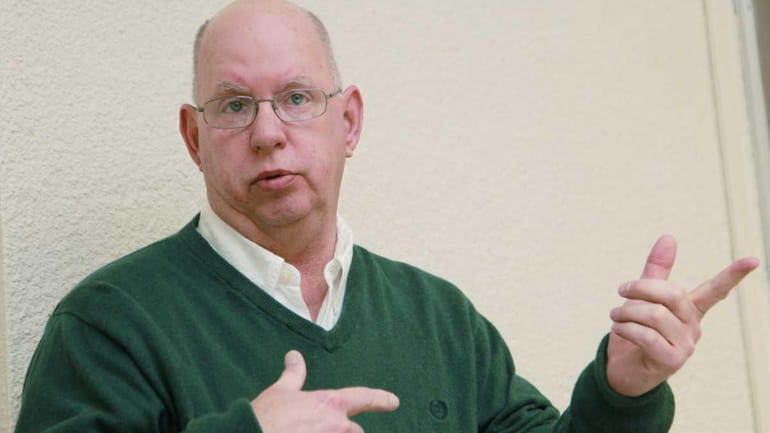Students learn about veterans and PTSD

Gary Richard, Veterans Service Officer, Suffolk County Veterans Service Agency, speaks at a veterans PTSD seminar at Stony Brook University. (April 23, 2012) Credit: Ed Betz
A former Army sergeant recounted to some two dozen students in a Stony Brook University nursing school classroom how he found it hard to control his life after coming home from four combat deployments to Iraq and Afghanistan.
Gary Richard said he drank heavily after returning to Long Island. Troubling memories kept him awake night after night. He grew distant from his wife, who eventually left him.
"War is not a John Wayne movie," said Richard, a counselor for the Suffolk County Veterans Service Agency. "The psychological wounds are just as real as the physical ones."
Responding to the growing number of troops returning from combat with psychological disorders and often hidden head wounds, the Obama administration this year has asked medical schools and nursing programs across the country to place greater emphasis on training their students to spot post-traumatic stress disorders and traumatic brain injuries among returning soldiers.
Administrators at Stony Brook University School of Medicine have responded by inviting veterans to speak to nursing students about how the constant threat of violence during combat deployments can leave veterans with chronic sleeplessness, fits of anger and emotional detachment from family and nonmilitary friends.
At Hofstra North Shore-LIJ School of Medicine, a former Army captain is helping to design a program that would help medical students spot war-related psychological and head traumas.
Andrew Roberts, who once pulled an injured soldier from an Iraq battlefield only to see him die of a massive head wound, said the Hofstra program would also invite veterans and members of their families to recount their experiences to medical students.
Of the more than 2 million troops who have served in Iraq or Afghanistan, as many as one in five have experienced post-traumatic stress disorder or major depression, according to data cited by the U.S. Department of Defense. And the number of traumatic brain injuries reported among Army soldiers has increased nearly 400 percent since 2003, according to Defense Department figures.
"Although PTSD is something that can impact anyone, we want to help our students understand military culture so they can appreciate the needs and special circumstances of our newest veterans," said Roberts, who is director of the Rosen Family Wellness Center, a North Shore-LIJ facility in Manhasset that offers psychological help to veterans.
Roberts said he was never injured while leading three platoons in combat in Iraq during a 2003-04 combat tour. But he said the feeling of being constantly under threat left him with uncontrollable anxieties that did not end after his military service. Even so, the West Point graduate said he initially did not seek help.
"It affected me for years," Roberts said.
Like Roberts, large numbers of troops who return showing symptoms of PTSD avoid seeking help, according to the U.S. Department of Veterans Affairs. The VA facility at Northport operates a special program for returning veterans suffering from PTSD.
The VA offers five years of free medical and psychological care to all combat veterans with a better than dishonorable discharge. But many veterans worry that acknowledging psychological troubles will upset loved ones or ruin job prospects.
"They're scared to death of asking for help because they are afraid they will lose their job, or that it will get back to their employer," Richard said. "It happened to me. But we've gone through horrors that an average person never does or can even imagine."
Richard said medical practitioners with veterans for clients should ask if they have been in combat, inquire about explosions or other trauma and find out if drinking, drug abuse or sleeplessness are issues. And because veterans can be resistant to opening up, doctors and nurses should also consider asking the patient's spouse about potential problems, he said.
Catherine Poulos, of Southampton, a nursing student who attended Richard's talk at Stony Brook, said she was surprised to learn of women's experiences in the military.
Poulos, a second-year nursing student, said she was so impressed by what she learned from Richard that she added information he provided to a psychological resources website she created as part of her Stony Brook coursework. "Literally within minutes, I was in the parking lot typing it in," she said.
Another Stony Brook nursing student, Pam Rathburn-Ray, said it was particularly helpful to learn that spouses can be the key in getting help to troubled veterans.
"Understanding that this population exists is invaluable to me," she said. "We have to target women, because it is they who are accessing health care for their families."
Urologist sexual abuse case ... Carcinogens found in West Islip ... Lab results for Bethpage park drums ... Rangers win game 2
Urologist sexual abuse case ... Carcinogens found in West Islip ... Lab results for Bethpage park drums ... Rangers win game 2
